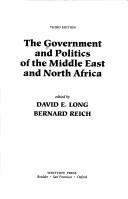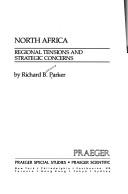| Listing 1 - 10 of 37 | << page >> |
Sort by
|

ISBN: 0415075904 Year: 1992 Publisher: London New York Routledge
Abstract | Keywords | Export | Availability | Bookmark
 Loading...
Loading...Choose an application
- Reference Manager
- EndNote
- RefWorks (Direct export to RefWorks)
Book
ISBN: 9782296110878 2296110878 Year: 2009 Publisher: Paris : [Tunis] : Harmattan ; Institut de recherche sur le Maghreb contemporain,
Abstract | Keywords | Export | Availability | Bookmark
 Loading...
Loading...Choose an application
- Reference Manager
- EndNote
- RefWorks (Direct export to RefWorks)
Deux approches caractérisent cet ouvrage qui revisite les notions plurielles de "réforme" et de "réformisme" dans l'espace méditerranéen des XIXe et XXe siècles : d'une part, le croisement des historiographies, entre ottomanisme et formation des Etats-nations dans le monde arabe ; d'autre part, une réflexion sur les mécanismes d'emboîtement des aires culturelles et des représentations qui les animent au Maghreb, par comparaison avec la Turquie et le Moyen-Orient. Cette recherche à plusieurs voix s'articule autour d'interrogations communes relatives aux temporalités des mutations institutionnelles et de l'élaboration de cadres nouveaux, aux instruments et aux médiateurs des réformes selon les pays concernés, ainsi qu'aux enjeux de l' "intériorisation" de nouvelles normes et valeurs culturelles. La première partie de l'ouvrage présente les mutations institutionnelles relatives à la construction de l'Etat. Elle s'attache à analyser la matérialité de la réforme lorsqu'elle se cristallise ou échoue, en termes d'institutionnalisation et d'élaboration d'un cadre juridique nouveau, quand bien même ce projet n'aurait pas abouti. La deuxième partie ouvre la discussion sur les modalités de construction des savoirs, de leur diffusion et de leur politisation qui provoque des débats entre réformistes, en particulier à propos de la place de la langue, de son statut et de ses usages. La troisième partie analyse la question des transferts de modèles à partir des réformes du XIXe siècle et de la première moitié du XXe siècle, comme une revendication politique et culturelle interne, supposant déjà un repositionnement culturel des sociétés concernées.

ISBN: 0813321263 0813321255 9780813321264 9780813321257 Year: 1995 Publisher: Boulder (Colo.) : Westview press,
Abstract | Keywords | Export | Availability | Bookmark
 Loading...
Loading...Choose an application
- Reference Manager
- EndNote
- RefWorks (Direct export to RefWorks)

ISBN: 0030718465 9780030718465 Year: 1984 Publisher: New York
Abstract | Keywords | Export | Availability | Bookmark
 Loading...
Loading...Choose an application
- Reference Manager
- EndNote
- RefWorks (Direct export to RefWorks)
Politics --- Northern Africa --- Africa, North --- Politics and government --- Strategic aspects --- North Africa --- Africa, North - Politics and government --- Africa, North - Strategic aspects
Book
Abstract | Keywords | Export | Availability | Bookmark
 Loading...
Loading...Choose an application
- Reference Manager
- EndNote
- RefWorks (Direct export to RefWorks)
Book
ISBN: 0865315469 Year: 1982 Publisher: Boulder, CO : Westview,
Abstract | Keywords | Export | Availability | Bookmark
 Loading...
Loading...Choose an application
- Reference Manager
- EndNote
- RefWorks (Direct export to RefWorks)
Book
ISBN: 9780815359128 Year: 2018 Publisher: London ; New York : Routledge Taylor & Francis Group
Abstract | Keywords | Export | Availability | Bookmark
 Loading...
Loading...Choose an application
- Reference Manager
- EndNote
- RefWorks (Direct export to RefWorks)
"This book examines the regime changes in Iraq and Libya to unravel the complexity of statebuilding in countries emerging from authoritarianism and conflict in the Middle East and North Africa (MENA) region. Framed in a comparative study of post-2003 Iraq and post-2011 Libya, the book examines changes in key state dimensions--representation and political authority, security, and economic wealth creation and distribution--in a continuous dialogue with past trajectories in these two countries. To grasp the nature and degree of these changes, the mechanisms of state formation are explored in light of a statebuilding agenda that, in its application from Iraq to Libya, has adapted to different political prerogatives. The analysis of Iraq and Libya serves the book's ultimate goal to address the debate on statebuilding from a regional (MENA) perspective and to lay the ground for the study of other contemporary cases undergoing radical and violent process of changes, such as in Syria and Yemen. The book grapples with problems associated with the difficult process of transition from authoritarianism through conflict and towards peace by focusing on the state, its structure and function. The work is informed by a large quantity of materials collected over the past five years, including secondary literature, policy papers and reports, and semi-structured interviews with key informants on Iraq and Libya. This book will be of much interest to students of statebuilding, Middle Eastern studies, peace and conflict studies, and International Relations in general"--
Book
ISBN: 0190942444 9780190942403 0190942428 9780190942410 0190942401 0190942436 019094241X Year: 2019 Publisher: New York : Oxford University Press,
Abstract | Keywords | Export | Availability | Bookmark
 Loading...
Loading...Choose an application
- Reference Manager
- EndNote
- RefWorks (Direct export to RefWorks)
The conservative, literalist Islamist current known as Salafism is often synonymous with extremism and militancy. In fact, Salafism is an adaptive, diverse and dynamic outlook that has emerged as a major social and political force across the Middle East, especially in the countries of the Arab Maghreb--Mauritania, Morocco, Algeria, Tunisia and Libya--a vitally important region that impacts the security and politics of Europe, sub-Saharan Africa and the broader Middle East. Through extensive interviews and fieldwork, Middle East scholars Frederic Wehrey and Anouar Boukhars explore the many roles and manifestations of Salafism in the Maghreb, to include its relationship with the Maghreb's ruling regimes, with competing Islamist currents, increasingly youthful populations, and communal groups like tribes and ethno-linguistic minorities. Particular attention is paid to how the boundaries between different Salafi currents--pro-regime "quietists," politically active "politicos" who participate in elections, and militant jihadists like al-Qaeda and the Islamic State, is increasingly blurred, demonstrating how seemingly immutable Salafi ideology is often shaped by local contexts and opportunities. Similarly, the authors show how Maghrebi Salafism is uniquely reflective of each country's political institutions, history, and social makeup and how the much-touted notion of Salafism as a monolithic Saudi or Gulf "export" is undermined by local realities. Informed by rigorous research, deep empathy, and unparalleled access to Salafi adherents, clerics, politicians, and militants, Salafism in the Maghreb offers a definitive account of this important Islamist current that is at once granular and accessible.
Salafīyah - Africa, North --- Islam and politics - Africa, North --- Africa, North - Politics and government - 21st century --- Salafīyah. --- Salafiyya --- Islamic sects --- Salafīyah --- Islam and politics --- Africa, North
Book
ISBN: 9780253354808 9780253222008 0253354803 0253222001 Year: 2010 Publisher: Bloomington : Indiana University Press,
Abstract | Keywords | Export | Availability | Bookmark
 Loading...
Loading...Choose an application
- Reference Manager
- EndNote
- RefWorks (Direct export to RefWorks)
Berbers --- Ethnicity --- Social life and customs --- Politics and government --- Africa, North --- Berbers. --- Politics and government. --- Social life and customs. --- Berbers - Africa, North --- Berbers - Africa, North - Social life and customs --- Berbers - Africa, North - Politics and government --- Ethnicity - Africa, North --- Africa, North - Social life and customs --- Africa, North - Politics and government
Book
ISSN: 1771673X ISBN: 9782724624755 9782724624786 2724624750 Year: 2019 Publisher: Paris : Sciences Po les presses,
Abstract | Keywords | Export | Availability | Bookmark
 Loading...
Loading...Choose an application
- Reference Manager
- EndNote
- RefWorks (Direct export to RefWorks)
Surpris par l'irruption des " révoltes arabes ", les régimes autoritaires d'Afrique du Nord ont, pour la plupart, fait preuve d'une certaine robustesse. Pour combien de temps encore ? Fin connaisseur de la région, Luis Martinez fait le point sur la situation de pays tels que l'Algérie, le Maroc, la Libye et la Tunisie. Il montre qu'en s'arcboutant aux deux fonctions héritées du pouvoir colonial, maintien de l'ordre et extraction des ressources naturelles, ces États ont omis de placer l'intérêt général au cœur de leur action. Incapables de se départir d'une obsession sécuritaire - partagée par la communauté internationale -, les yeux braqués sur la bande sahélo-saharienne, nouvel épicentre du jihadisme, leurs gouvernants paraissent ignorer le véritable défi qui se pose à eux : répondre à la colère d'une jeunesse nombreuse et au chômage, et gagner la loyauté d'un peuple qui paie le prix de la corruption, de modèles erronés de développement économique et d'une absence d'État-providence.
Authoritarianism --- Islamic fundamentalism --- Arab Spring, 2010 --- -History --- History --- Africa, North --- Politics and government --- AFRICA, NORTH--POLITICS AND GOVERNMENT --- AUTHORITARIANISM--AFRICA, NORTH --- ISLAMIC FUNDAMENTALISM--AFRICA, NORTH --- ARAB SPRING, 2010 --- -Authoritarianism --- -Politique et gouvernement --- Djihadistes --- Printemps arabe (2010-....) --- Authoritarianism - Africa, North - History - 21st century --- Islamic fundamentalism - Africa, North - History - 21st century --- -Africa, North - Politics and government - 21st century --- -Africa, North
| Listing 1 - 10 of 37 | << page >> |
Sort by
|

 Search
Search Feedback
Feedback About UniCat
About UniCat  Help
Help News
News